How is he still alive? Tragic images of Palestinian, 21, reduced to mere skin and bone as he suffers severe malnutrition in Gaza
Shocking images from Gaza show the devastating effects of severe malnutrition on people trapped in the war-torn enclave. In the latest tragic photos, a young, hungry man appears to be reduced to skin and bones.
A number of photos of 21-year-old Ahmed Al-Najjar have emerged from Gaza as the Palestinian territory continues to be ravaged by Israeli raids.
The harrowing footage shows the young man lying on what appears to be a bed made of wooden planks, a single pillow and a thin mattress wrapped in a sheet.
A photo shows Ahmed, shirtless, trying to hold his body up with his arms, but his skin is sucked into the hollow space between his bones.
His rib cage appears noticeably prominent, his jawline is sharp, and his skin hangs from his bones—a heartbreaking symptom of the malnutrition and brain atrophy he suffers from.
Images have emerged of Ahmed Al-Najjar, 21, from Gaza. The young man is suffering from malnutrition and brain atrophy
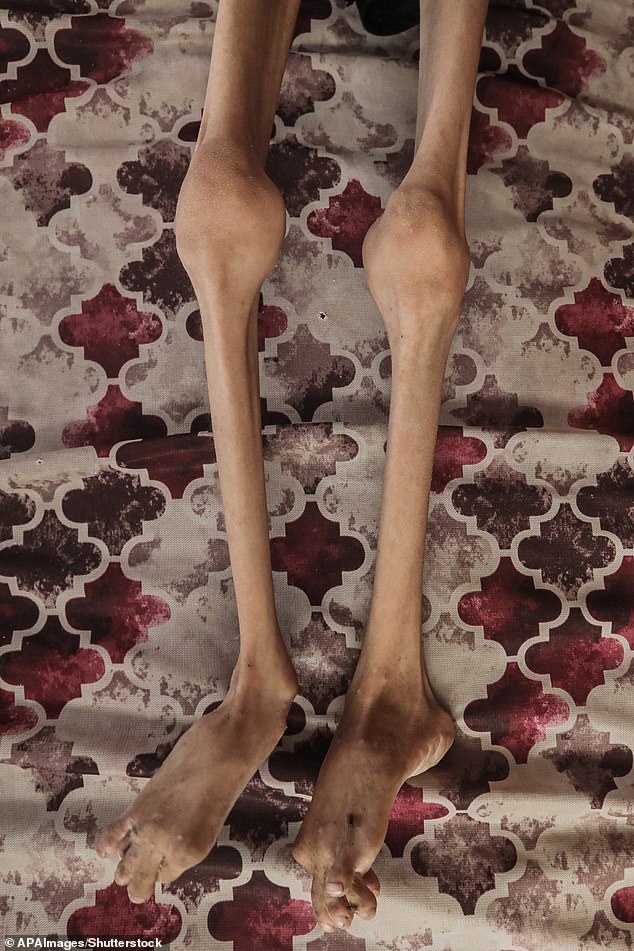
Haunting images of his legs show his thin skin clinging to his bones, with no fat or muscle visible to the eye
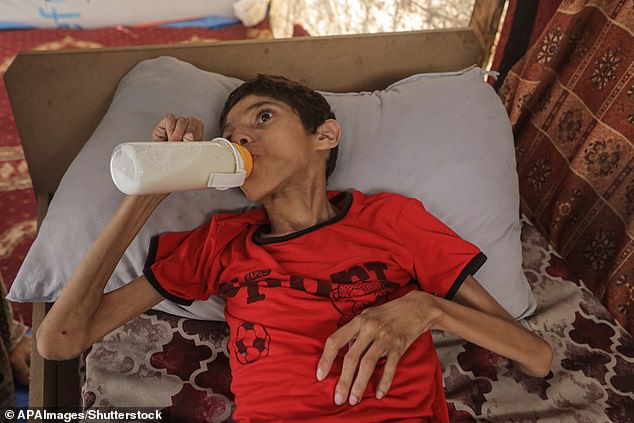
A third photo shows Ahmed drinking milk from a bottle while staring into the distance
Another chilling photo shows a close-up of Ahmed’s legs, which appear too weak to support his body if he were to try to stand.
His thighs, knees, shins and feet are nothing more than bones, covered in a thin layer of skin, with not an inch of muscle or fat visible.
Ahmed’s toes appear deformed, curling forward and bending in different directions, a sign that he may never walk again.
A third and final photo of the young man shows him drinking from a small bottle that appears to be milk.
His long, thin fingers are wrapped around a small handle, while his other hand rests on his stomach as he drinks.
Ahmed’s red ‘sports’ T-shirt, featuring a cartoon image of a teddy bear and a football, hangs loosely from his body, the armholes gaping around his small upper arms.
He can be seen staring into the distance and drinking the white liquid. He holds up the plastic bottle and lies on his back.
But Ahmed is just one of thousands of Palestinians suffering from malnutrition as a result of Israeli restrictions on humanitarian aid.
According to the UN agency for Palestinian refugees (UNRWA), more than 50,000 children in the Gaza Strip require immediate medical treatment for acute malnutrition.
In a statement last month, the agency said that “people in Gaza continue to face dire hunger due to ongoing restrictions on humanitarian access.
‘UNRWA teams are working tirelessly to reach families with aid, but the situation is catastrophic’.
UNICEF’s mission was to drive a truckload of nutritional and medical supplies to 10,000 children, spokesman James Elder said in June.
Their task was to deliver the relief supplies, which had been pre-approved by the Israeli authorities, from Deir el-Balah to Gaza City.
“It took 13 hours and we spent eight hours of that going around checkpoints, arguing about paperwork – ‘was it a truck or a van?’” Elder said.
“The reality is that this truck was denied access. Those 10,000 children did not receive that assistance… Israel as an occupying power has a legal responsibility to facilitate that assistance.”
The Deputy Executive Director of the United Nations World Food Programme, Carl Skau, added: “The situation in southern Gaza is deteriorating rapidly. One million people in southern Gaza are trapped without clean water or sanitation in a very crowded area along the beach in the scorching summer heat.”
Ahmed’s photos clearly show the impact of the Israeli bombardment on Gaza, after seven people were killed during an Israeli military operation in the West Bank city of Jenin, Palestinian authorities said Friday.
The Israeli military said it was conducting “counter-terrorism activities,” including an airstrike.
According to the army, Israeli soldiers had “surrounded a building where terrorists had barricaded themselves” and exchanged fire, while an airstrike had hit “several armed terrorists” in the area.
According to the Palestinian Ministry of Health, a total of seven people were killed, but it did not specify whether this was caused by the gunfight or the airstrike.
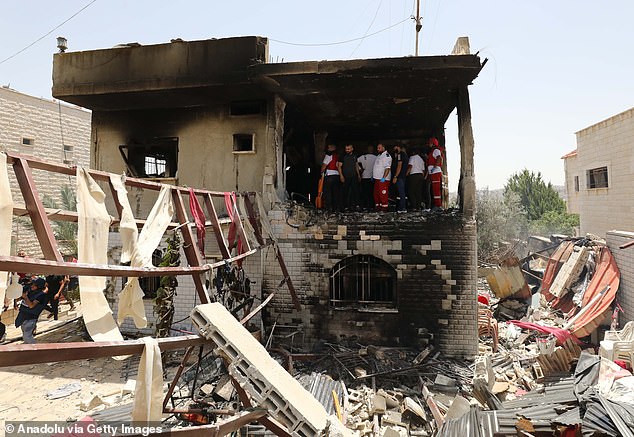
Search and rescue operations continue after at least seven Palestinians were killed in an Israeli attack on the Jenin refugee camp in the Gaza Strip on July 5, 2024
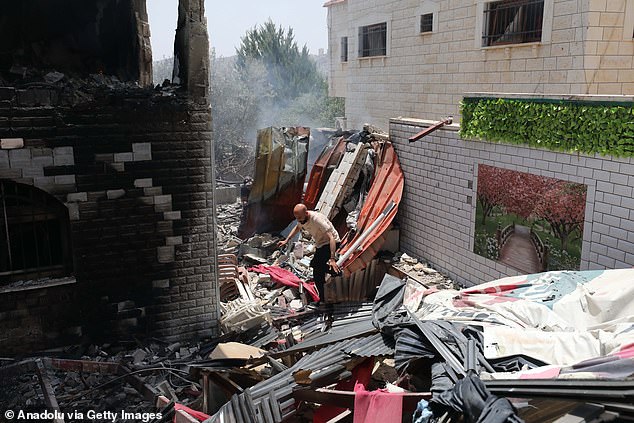
A Palestinian is seen searching through the smoking rubble of a building destroyed in an Israeli attack on Friday.
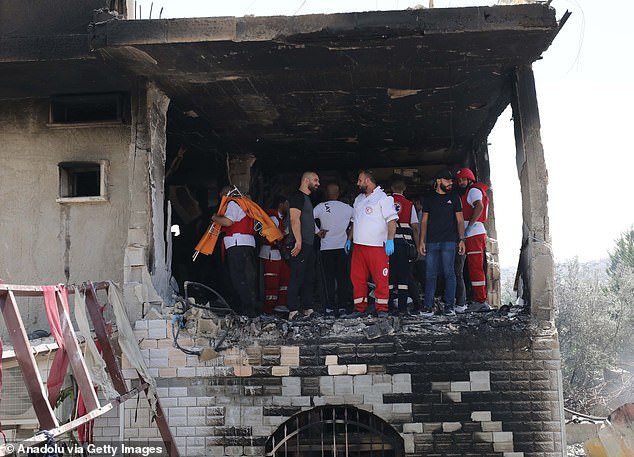
The Palestinian Ministry of Health reported that a total of seven people were killed, but did not specify whether they were killed in the gunfight or in the airstrike.
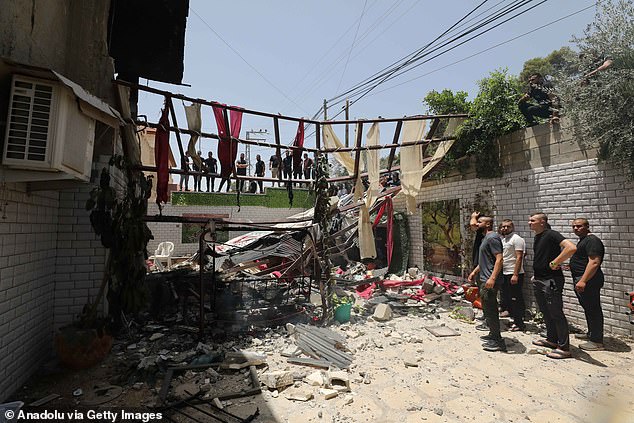
The Israeli military said it was conducting “counter-terrorism activities” including an airstrike
The militant group Islamic Jihad named four of the dead as its members.
The fighting in Jenin, a known militant stronghold where the army regularly operates, came a day after an Israeli anti-settlement group said the government plans to build nearly 5,300 new homes in settlements in the occupied West Bank.
The construction plans revealed by the Peace Now group are part of the radical government’s efforts to expand settlements, part of a strategy to consolidate Israel’s control over the West Bank and prevent a future Palestinian state.
The Palestinians want an independent state in the West Bank, East Jerusalem and Gaza, areas captured by Israel in the 1967 Middle East war.
Violence in the West Bank has increased since the start of Israel’s war in Gaza, sparked by the October 7 invasion of southern Israel by Hamas militants, killing some 1,200 people, mostly civilians, and taking more than 200 hostage.
According to the Gaza Ministry of Health, more than 38,000 Palestinians have died in the war so far.
Ceasefire talks appear to be picking up steam after weeks of stalling. Israeli Prime Minister Benjamin Netanyahu’s office said he was sending negotiators to restart talks, a day after Hamas gave mediators its latest response to a U.S.-backed deal proposal.
The revival of negotiations appears to be a fresh attempt by US, Qatari and Egyptian mediators to bridge the rift that has repeatedly stood in the way of an agreement in recent months.
Hamas wants a deal that would see Israeli troops leave Gaza completely and the war end. Netanyahu, on the other hand, says the war cannot end until Hamas is eliminated.
Israeli negotiators are expected to arrive in Doha, the capital of Qatar, on Friday for talks attended by US, Egyptian and Qatari officials.
